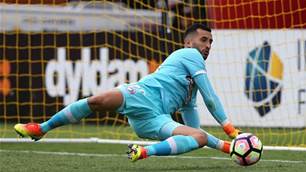Australian football needs to adapt to modern demands, not turn to nostalgia, in order to produce a new generation of high-quality and creative players says Melbourne Victory Technical and Academy Director Drew Sherman.
Sherman, 32, holds a UEFA Pro Licence and, prior to his arrival in the Southern Hemisphere, worked in the youth set-ups of Southampton, Aldershot Town, Everton and Crawley Town. He managed the Cook Islands to their highest ever FIFA ranking and first-ever competitive international wins before being appointed as Brisbane Roar’s Technical Director in 2017.
Moving to Melbourne after guiding Roar to the 2018/19 Y-League crown, he was named Victory’s academy boss in March 2019 and in October, as he did in Brisbane, helped remove fees for youngsters in the youth set-up of the four-time A-League Champions.
Casting his eyes over the current Australian football landscape, he believes that proper perspective is required not only around the global nature of its ills but also in recognising that modern life, with all its distractions and restrictions, can’t simply be wished away to aid in developing youth.
It’s not a unique view in footballing circles; a 2019 study from Professional Footballers Australia examining the factors that led to the creation of the Golden Generation identifying the need to not attempt to re-create the conditions of the late ’80s and early ‘90s but, instead, to find new socially and culturally appropriate “inputs” that would lead to the similar “outputs” of the Golden Generation.
“You’re talking about people saying ‘well, in the older systems we were producing more creative players so let’s go back to the old system’ and I think that’s dangerous,” Sherman said.
“In what industry do you go back 25 years to find the solutions? It just does not happen. What you do is you understand why those challenges have arisen, the societal reasons behind that, and you adapt from there.

“So, I think the existing structures, with people that have a perspective of those reasons and know what those existing structures look like, need to be persevered with.
“What you’re seeing now is fewer clubs that have parent coaches or similar – novice coaches – that adopted a curriculum because it was something and they had nothing before that, and they applied that.
“Now we have more professionals in youth development with a wider range of experience that don't go off the curriculum necessarily, what they do is look at the strengths of individual kids and try and make them better at those while also improving on weaknesses that could be limiting factors.
“I think what you find is that time will right that wrong. And it’s just the reality because it’s happened elsewhere in the world -- you can’t go back to 25 years ago, it’s a different time.
“The unstructured football that did exist, it has to be formal now. There’s a load of reasons, as a parent for that as much as anything else - you think about what kids did unsupervised 25 or 30 years ago that parents wouldn’t be comfortable with now.
“So, it’s almost down to the clubs to create unstructured training environments but that is safe for parents to drop their kids off to. It is a problem, it’s definitely a problem, but its not a problem that is confined to this country.”
Related Articles

Socceroo-in-waiting seals Championship deal

Fringe Socceroo swerves A-League to remain in Europe after Fulham exit













